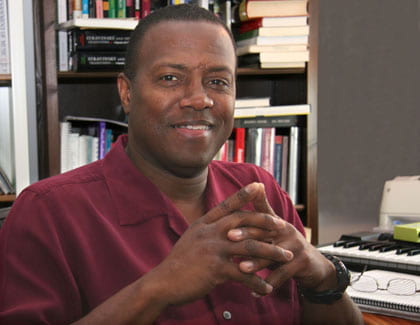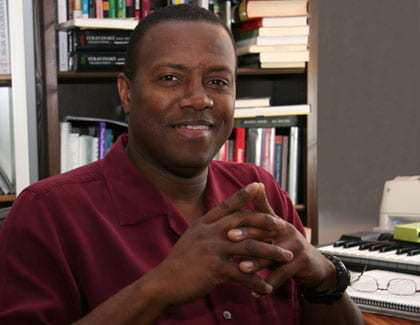Knowing the score
Stephen Tucker, conductor of the UCI Symphony Orchestra, prepares students for rigors of music career

Stephen Tucker, conductor of the UCI Symphony Orchestra, keeps a pair of gloves and work boots in his garage in case he can no longer find work as a musician: “I might need another job digging ditches,” he says.
Tucker hasn’t had to pick up a shovel yet; the only tool the maestro wields is a baton. His boots and gloves are proof of his practicality – his view that only the fortunate few, the hardworking and the talented find careers as musicians. It’s a lesson he impresses on his students.
“I tell them I should give them a cap and apron, because they might be flipping burgers if they don’t work hard,” says Tucker, assistant professor of music in the Claire Trevor School of the Arts. “Some students say, ‘You’re mean.’ But I need to prepare them for life. They have to work hard, if they’re going to pursue this seriously.”
While Tucker keeps his students’ feet firmly planted on earth, he helps them play music that makes their spirits soar. On May 3, they’ll get what he calls a once-in-a-lifetime learning opportunity to perform with violinist Cho-Liang Lin at the Irvine Barclay Theatre.
Taiwan-born Lin has appeared as a soloist with major orchestras worldwide. A member of The Juilliard School faculty, he has received several Grammy nominations and Gramophone’s Record of the Year award. Tucker met the virtuoso after one of Lin’s concerts, and the two later brainstormed about a UCI performance over lunch.
“He’s the consummate musician, the kind of person I want the students to model,” Tucker says. “He wanted to come to UCI because somehow we connected, and he’s dedicated to teaching.”
Called Violin Spectacular, the concert will feature Mozart’s “Violin Concerto No. 4,” “Zigeunerweisen” by Pablo de Sarasate and “Out of Peking Opera,” a concerto for violin written for Lin by Tan Dun, Crouching Tiger, Hidden Dragon composer.
“This concert broadens students’ educational experience,” Tucker says. “My job is to make them as ready to play with him as possible.”
The 70-member orchestra isn’t just composed of music majors. About half come from other disciplines, including two medical students. Faculty and community members also play.
“We have fantastic musicians who have been playing all of their lives,” Tucker says. “The non-music majors bring a certain level of excitement to the orchestra. They’re doing this out of sheer desire.” One goal of the Lin concert is to draw attention to their contribution to the orchestra, and spearhead fundraising efforts to pay for their music lessons, which currently are provided only to music majors.
“Undergraduate education is not supposed to lock you into a lifetime job. It’s supposed to open your eyes to the world,” Tucker says. “The Lin concert ties right in with that.”

